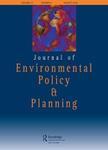版权所有:内蒙古大学图书馆 技术提供:维普资讯• 智图
内蒙古自治区呼和浩特市赛罕区大学西街235号 邮编: 010021

作者机构:Venezuela Inst Sci Res IVIC Ctr Study Social Transformat Sci & Knowledge Syst Apartado Postal 21827 Caracas Venezuela Univ Texas Austin Sch Architecture Program Community & Reg Planning Austin TX 78712 USA Univ Simon Bolivar Dept Environm Studies Caracas Venezuela Cent Univ Venezuela Dev Studies Ctr CENDES Caracas Venezuela
出 版 物:《JOURNAL OF ENVIRONMENTAL POLICY & PLANNING》 (环境政策与规划杂志)
年 卷 期:2018年第20卷第6期
页 面:693-712页
核心收录:
学科分类:0830[工学-环境科学与工程(可授工学、理学、农学学位)] 0201[经济学-理论经济学] 08[工学] 0833[工学-城乡规划学]
基 金:National Fund for Science and Technology (FONACIT) [G-2005000514] Fulbright-Hays dissertation award Peace Studies Fellowship from the MacArthur Foundation NSF Direct For Social, Behav & Economic Scie Division Of Behavioral and Cognitive Sci Funding Source: National Science Foundation
主 题:Fire management cultural identity reflexive governance Pemon Canaima National Park
摘 要:The concept of reflexive governance has to a large extent emerged from an increasing recognition of the need to consider different meanings of nature in the environmental policy-making process. Yet, so far, little attention has been paid to creating conditions for reflexive governance among different actors in intercultural settings, particularly in the context of environmental conflict and strong cultural change among indigenous peoples. This paper reviews three participatory research projects carried out in the Gran Sabana in Canaima National Park, Venezuela, which facilitated dialogue among indigenous people regarding their conflicting views of fire, in part by developing community-wide critical reflections on processes of cultural change and identity formations. These experiences suggest that once marginalized environmental knowledge is publicly acknowledged within the context of endogenous cultural processes, indigenous people feel more confident to engage in dialogue with other actors, thus allowing the emergence of reflexive environmental governance.